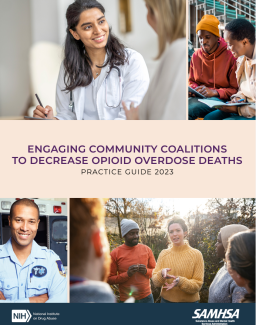In the face of the opioid overdose crisis, community coalitions play a pivotal role in driving change. Whether you’re starting a new coalition or strengthening an existing one, this page includes a repository of knowledge, tools, and real-world examples to help with the process. Discover how to strengthen partnerships, build trust, and listen to local expertise.
What You’ll Find Here
- Practice Guide: A comprehensive guide that offers step-by-step insights on establishing and sustaining community coalitions. Dive into practical tools, case studies, and best practices.
- Coalition Assessment Tool: Assess how a coalition's membership may influence decision-making and reflect on who is missing from the table.
- General Principles of Community Engagement: An overview of community engagement, outlining principles and providing strategies for integrating community engagement into substance use prevention efforts.
- Real-World Insights: Stories and lessons learned from successful coalitions across different regions will help other communities build and strengthen local coalitions.

